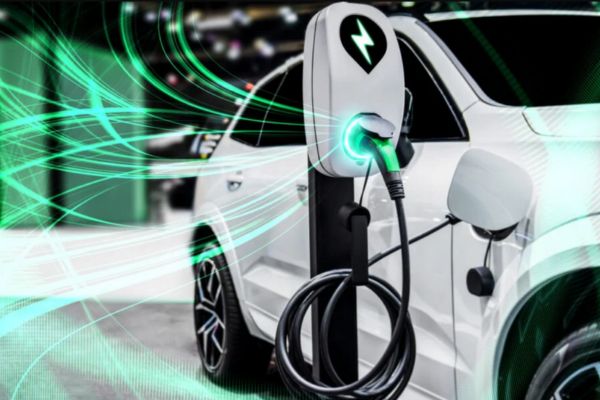In recent years, there has been a notable transition in the automotive sector towards sustainable and electric vehicles. Electric vehicles (EVs) have emerged as a promising solution to combat climate change and reduce carbon emissions associated with traditional internal combustion engine vehicles. As the adoption of EVs accelerates, so does the demand for robust, accessible, and cost-effective charging infrastructure.
This article explores the current landscape of EV charging infrastructure in India and delves into the cutting-edge advancements transforming this vital ecosystem.
The Current Landscape of EV Charging in India
The Indian EV market was valued at approximately USD 5.48 billion in 2023. With a projected CAGR of 34.7% from 2024 to 2032, it is expected to reach USD 95.23 billion by 2032, indicating significant growth potential. India’s dedication to electric mobility is apparent through its ambitious goals: achieving 30% electric private cars, 70% electric commercial vehicles, 40% electric buses, and 80% electric two-wheelers and three-wheelers by 2030. This mirrors the global trend of reducing carbon emissions and embracing eco-friendly transportation alternatives.
Currently, the EV charging landscape in India is characterised by a mix of public and private charging stations. Public charging stations are typically set up by government agencies, power distribution companies, or public sector undertakings. Private players, including automobile manufacturers, oil marketing companies, and independent entities, are also actively contributing to the expansion of charging networks.
As of February 2 this year, Minister of State for Heavy Industries, Krishan Pal Gurjar, announced an increase in the number of operational electric vehicle (EV) charging stations across the country, reaching a total of 12,146. According to the minister’s data, Maharashtra takes the lead with 3,079 EV charging stations, trailed by Delhi with 1,886, and Karnataka in third place with 1,041 charging stations.
However, the current infrastructure falls short of what’s needed to support a large-scale EV rollout. The density of charging stations is relatively low, particularly in comparison to gasoline stations. Additionally, charging speeds vary considerably, with some stations offering slow AC charging and others featuring faster DC charging options. This disparity in charging speeds can significantly impact user experience, with slow charging times acting as a deterrent for potential EV buyers.
Innovation: Powering the Future of EV Charging
To overcome these challenges and empower a truly sustainable transportation ecosystem, several innovative solutions are emerging in the domain of EV charging infrastructure. In the coming years, we will see some key trends emerging:
Fast Charging Technologies: Advancements in battery technology are being mirrored by innovations in fast charging. Technologies like DC Fast Charging and Ultra-Fast Charging can significantly reduce charging times, potentially bringing them down to under 30 minutes for a substantial battery top-up. This addresses range anxiety and makes EVs a more viable option for long-distance travel.
Smart Charging Solutions: Smart charging systems utilise intelligent algorithms to optimise charging based on factors like grid demand, energy costs, and user preferences. This not only helps to ensure grid stability but also allows users to take advantage of off-peak electricity tariffs, making EV charging more economical.
Wireless Charging: While still in its nascent stages, wireless charging holds immense promise for the future. This technology eliminates the need for physical cables and connectors, offering a more convenient and user-friendly charging experience. Imagine seamlessly charging your EV while parked in your garage or designated parking spots.
Battery Swapping Stations: Battery swapping stations offer a unique solution, particularly for two-wheeled and three-wheeled EVs. Here, a depleted battery pack can be swiftly swapped for a fully charged one, significantly reducing turnaround times. This approach is particularly beneficial for commercial fleet operators who require continuous operation of their vehicles.
Public-Private Partnerships: Collaborative efforts between government agencies and private players are crucial for accelerating the development of a robust charging infrastructure. Public funding can incentivise private companies to invest in charging station establishment, while private sector expertise can drive innovation and ensure efficient operation.
Addressing Challenges: Building a Sustainable Ecosystem
Despite these advancements, several challenges need to be addressed to ensure the sustainable development of EV charging infrastructure. These include:
Standardisation: The lack of uniform standards for charging connectors and protocols can create confusion and inconvenience for users. Establishing clear and universal standards is essential to ensure seamless interoperability between EVs and charging stations.
Grid Integration: Integrating a large number of EVs with the existing power grid requires careful planning and infrastructure upgrades. Grid operators need to ensure sufficient capacity to meet the increased electricity demand from EVs without compromising grid stability.
Cost Considerations: Setting up charging stations involves significant upfront costs. Government incentives, tax breaks, and financing options are crucial to encourage wider participation from private investors and make charging station ownership more financially viable.
The Road Ahead: A Charged Future for Mobility
The Indian government’s commitment to EV adoption, coupled with the innovative solutions emerging in the EV charging space, paints an optimistic picture for the future of electric mobility. By fostering innovation, facilitating collaboration, and addressing existing challenges, India can create a robust and sustainable EV charging infrastructure that empowers a cleaner and more sustainable transportation ecosystem.
This transition will not only benefit the environment but also unlock new economic opportunities. The EV sector is poised to create new jobs in areas like manufacturing, installation, and maintenance of charging stations. Additionally, it will foster the development of a thriving ecosystem of technology providers, service companies, and renewable energy solutions.
In conclusion, the journey towards a sustainable transportation future hinges on a robust and innovative EV charging infrastructure. By embracing advancements in charging technologies, fostering public-private partnerships, and addressing standardisation and grid integration challenges, India can create a future where electric vehicles are not just an alternative, but the preferred mode of transportation. This shift will not only curb carbon emissions and combat climate change but also unlock a new era of economic growth and technological innovation, paving the way for a cleaner, greener tomorrow.















